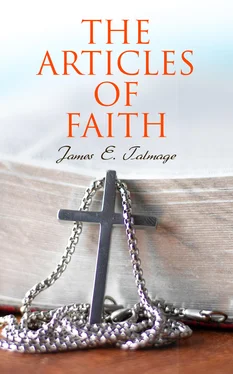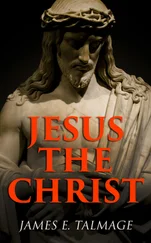2. What is Theology?—The word "theology" is of Greek origin; it comes to us from Theos , meaning God, and logos —a treatise, or discourse, signifying by derivation, therefore, collated knowledge of Divinity, or the science that teaches us of God, implying also the relation existing between the Supreme Being and His creatures. The term is of very ancient usage, and may be traced to pagan sources. Plato and Aristotle speak of theology as the doctrine of Deity and divine things. Concisely defined, theology "is that revealed science which treats of the being and attributes of God, His relations to us, the dispensations of His providence, His will with respect to our actions, and His purposes with respect to our end." 1
3.It has been held by some as a truth, that theological knowledge is not properly a subject for analytical and otherwise scientific treatment on the part of man; that inasmuch as a true conception of Deity, with which theology has primarily to deal, must necessarily be based upon revelation from the source divine, we can but receive such knowledge as it is graciously given; and that to attempt critical investigation thereof by the fallible powers of human judgment would be to apply as a measure of the doings of God the utterly inadequate wisdom of man. Many truths are beyond the scope of unaided human reason, and theological facts have been declared to be above reason; this is true so far as the same remark might be applied to any other kind of truth; for all truth, being eternal, is superior to reason in the sense of being manifest to reason, but not a creation of reason; nevertheless truths are to be estimated and compared by the exercise of reason.
4. The Extent of Theology.—Who can survey the boundaries of this science? It deals with Deity—the fountain of knowledge, the source of wisdom; with the proofs of the existence of a Supreme Being, and of other supernatural personalities; with the conditions under which, and the means by which, divine revelation is imparted; with the eternal principles governing the creation of worlds; with the laws of nature in all their varied manifestations. Primarily, theology is the science of God and religion; it seeks to present "the systematic exhibition of revealed truth, the science of Christian faith and life." But in a more general sense, theology has to do with other truths than those which are specifically called spiritual; its domain is co-extensive with that of truth.
5.The industrial pursuits that benefit mankind, the arts that please and refine, the sciences that enlarge and exalt the mind, are but fragments of the great though yet uncompleted volume of truth that has come to earth from a source of eternal and infinite supply. The comprehensive study of theology, therefore, would embrace all known truths. God has constituted Himself as the great teacher;2 by personal manifestations or through the ministrations of His appointed servants, He instructs His mortal children. To Adam He introduced the art of agriculture,3 and even taught by example that of tailoring;4 to Noah and Nephi He gave instructions in ship building;5 Lehi and Nephi were taught of Him in the arts of navigation;6 and for their guidance on the water, as in their journeyings on land, He prepared for them the Liahona.7 a compass operated by a force more effective than that of terrestrial magnetism; furthermore, Moses received divine instructions in architecture.8
6. Theology and Religion, though closely related, are by no means identical. A person may be deeply versed in theological lore, and yet be lacking in religious, and even in moral traits. Theology may be compared to theory, while religion represents practice; if theology be precept, then religion is example. Each should be the complement of the other; theological knowledge should strengthen religious faith and practice. As accepted by the Latter-day Saints, theology comprehends the whole plan of the gospel. "Theology is ordered knowledge, representing in the region of the intellect what religion represents in the heart and life of man."9 Knowledge may have to do with the intellect only, and however sublime its import, it may fail to affect the hardened heart.
7. The "Articles of Faith."—The beliefs and prescribed practices of most religious sects are usually set forth in formal creeds. The Latter-day Saints announce no creed as a complete code of their faith; for while they hold that the precepts of eternal life are unchangeable, they accept the principle of continuous revelation as a characteristic feature of their belief. However, when asked for a concise presentation of the principal religious views of his people, Joseph Smith, the first prophet of the Church in the present dispensation, announced as a declaration of belief the "Articles of Faith of the Church of Jesus Christ of Latter-day Saints." These include the more essential and characteristic features of the gospel as accepted by this Church; but they are not complete as an exposition of our belief, for by one of the Articles it is declared, "We believe all that God has revealed, all that He does now reveal, and we believe that He will yet reveal many great and important things pertaining to the Kingdom of God." From the time of their first promulgation, the Articles of Faith have been accepted by the people,10 and on October 6, 1890, the Latter-day Saints, in general conference assembled, re-adopted the Articles as part of their guide in faith and conduct. As these Articles of Faith present the leading tenets of the Church in systematic order, they suggest themselves as a convenient outline for our plan of study.
8. The Standard Works of the Churchform our written authority in doctrine; but they are by no means our only sources of information and instruction on the theology of the Church. We believe that God is as willing to-day as He ever has been to reveal His mind and will to man, and that He does so through chosen and appointed channels. We rely therefore on the teachings of the living oracles of God as of equal validity with the doctrines of the written word, the men in chief authority being acknowledged and accepted by the Church as prophets and revelators, and as being in possession of the power of the holy Priesthood. The written works adopted by the vote of the Church as authoritative guides in faith and doctrine are four—the Bible, the Book of Mormon, the Doctrine and Covenants, and the Pearl of Great Price. Other works have been and are being issued by officers and members of the Church, and many such books are unreservedly sanctioned by the people and their ecclesiastical authorities; but the four publications named are the only regularly constituted standard works of the Church. Of the doctrine treated in the authorized standards, the Articles of Faith may be regarded as a fair, though necessarily but an incomplete epitome.
JOSEPH SMITH, THE PROPHET.
9. Joseph Smith, whose name is appended to the Articles of Faith, was the prophet through whom the Lord restored to earth in these the last days the Gospel, and this in accordance with predictions made in previous dispensations. The question of the divine authenticity of this man's mission is an all-important one to earnest investigators of Latter-day Saint doctrines. If his claims to a God-given appointment be false, forming, as they do, the foundation of the Church in the last dispensation, the superstructure cannot be stable; if, however, his purported ordination under the hands of heavenly personages be a fact, one need search no further for the cause of the phenomenal strength and growing power of the restored Church. The circumstances of the divine dealings with Joseph Smith, the marvelous development of the work instituted by this modern prophet, the fulfilment through his instrumentality of many of the grandest predictions of old, and his own prophetic utterances with their literal realizations, will yet be widely acknowledged as proof conclusive of the validity of his ministry.11 The exalted claims maintained for him and his life's work, the fame that has made his name known for good or evil among most of the civilized nations of the earth, the vitality and growing strength of the religious and social systems which owe their origin as nineteenth-century establishments to the ministrations of this man, give to him an individual importance warranting at least a passing consideration.
Читать дальше












